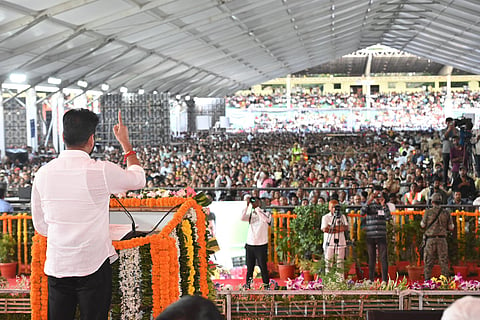
Hyderabad- After Bihar and Andhra Pradesh, Telangana has become the third state to initiate a caste-based survey. The Congress government in Telangana has taken a step forward in fulfilling its electoral promises by initiating the survey process. The Chief Secretary, Shanti Kumari, has recently issued the orders in this regard.
A comprehensive family survey aimed at enhancing social, economic, educational, employment, and political opportunities for BCs, SCs, STs, and other marginalized groups was decided upon during a Cabinet meeting chaired by Chief Minister Revanth Reddy on February 4.
This move is being considered a significant decision for the backward castes and Scheduled Castes in the state, who have long struggled for their rights.
After receiving approval from the Legislative Assembly, the government has issued directives to carry out a door-to-door family survey across the state, with a 60-day deadline for completion. Chief Secretary Shanti Kumari recently issued Government Order, appointing the Planning Department as the nodal agency responsible for overseeing the process.
In its verdict on August 1, 2024, the Supreme Court granted states the authority to sub-classify Scheduled Castes (SCs) in order to ensure justice for those sections of society that have not been able to benefit adequately from reservations. After this landmark decision, the Telangana government announced that it would implement the decision and integrate it with the caste-based survey.
Chief Minister Revanth Reddy immediately responded to the Supreme Court's ruling and pledged that Telangana would implement the decision first. He announced that a caste-based survey would be conducted to accurately assess the population and status of all castes in the state.
Inspired by Congress MP Rahul Gandhi's stance on caste census, especially in Congress-ruled states, Chief Minister Revanth Reddy followed suit in announcing the decision for Telangana.
This process has now commenced, with efforts underway to collect accurate data on the population of each caste, helping determine how much reservation and benefits from government schemes each caste is entitled to.
The Chief Minister stated that all preparations for the caste survey have been completed. The survey will gather data from families of all backward and Scheduled Castes in the state. The Planning Department has been tasked with providing all necessary resources for the survey and ensuring its timely completion. A senior IAS officer will be appointed to coordinate between the Planning Department and the BC Commission for the successful execution of the survey.
The caste-based survey is also politically significant for the Congress government in Telangana, as it seeks to attract the backward and Scheduled Caste communities to its side. The demand for caste-based census in the state has been ongoing for a long time, but only now is it being implemented.
The Chief Minister also declared that local body elections would not be held until the caste-based survey is completed. He has set the deadline for submitting the census report as December 9, 2024, which coincides with the birthday of Congress leader Sonia Gandhi.
Along with the survey, the Telangana government has also started working on the sub-classification of SCs. A one-member commission has been formed, chaired by Justice Shameem Akhtar, to study how SC sub-classification should be implemented. The commission is expected to submit its report within 60 days.
The Chief Minister has directed all departments to provide the necessary data and information required by the commission for the census and sub-classification. The commission will develop a scientific methodology for implementing SC sub-classification and ensure that all groups within the society receive proper representation.
In Bihar’s caste survey conducted last year, it was found that the OBC population in the state stands at 63.13%, which led to a significant increase in the reservation quotas for government jobs and educational institutions. The Andhra Pradesh government also initiated a caste-based survey in January this year.
You can also join our WhatsApp group to get premium and selected news of The Mooknayak on WhatsApp. Click here to join the WhatsApp group.